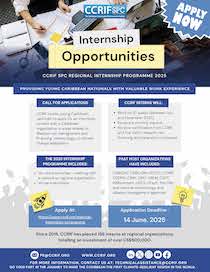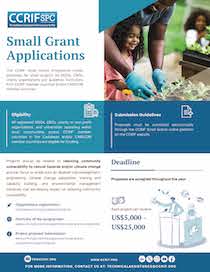September 14, 2009 – An important new publication, Climate Sense, was launched at the World Climate Conference-3 (WCC-3) on August 31. At the launch, Mr Hong Yan, Deputy Secretary-General of the World Meteorological Organisation, noted that, through its sharing of best practices across a variety of disciplines and sectors, Climate Sense is a significant resource to support the Global Framework for Climate Services coming out of WCC-3. Climate Sense is a user-friendly information tool what will help countries to plan ahead in the face of changing climate conditions.
The Caribbean Catastrophe Risk Insurance Facility (CCRIF) contributed a chapter to Climate Sense, describing the CCRIF model as an innovative risk transfer option that can be included in adaptation strategies for countries vulnerable to hurricanes and earthquakes. CCRIF is an insurance mechanism created by small island states within the Caribbean, and is the only working model of a multi-national and parametric-based catastrophe risk pool. CCRIF issues parametric insurance policies, which use modelled hazard parameters as a basis for loss estimation and payment.
Parametric policies enable very rapid payouts, providing governments with liquidity to help with immediate post-disaster recovery as well as medium term rebuilding efforts.
The chapter explains that CCRIF’s recent development of its own catastrophe modelling platform – with the help of Kinetic Analysis Corporation (KAC) – broadens the scope of potential financial instruments which could be made available for risk management and mitigation in both the public and private sectors. Of great significance to many Caribbean nations, CCRIF and KAC, in partnership with the Caribbean Institute for Meteorology and Hydrology (CIMH), are adding a new product; they are currently developing a rainfall index aimed at representing flood impacts. The chapter notes that the rainfall product is of particular interest in the agriculture sector, where index insurance is seen as a potential solution to achieving cost-effective insurance programmes for the region’s agricultural industry since traditional insurance products are either too expensive for most farmers or require unsustainable government subsidies. CCRIF is collaborating with numerous
Caribbean organisations such as the Caribbean Disaster and Emergency Management Agency (CDEMA) and the University of the West Indies (UWI) to integrate risk transfer instruments within the region’s comprehensive disaster risk management framework.
About CCRIF: CCRIF is a risk pooling facility, owned, operated and registered in the Caribbean for Caribbean governments. It is designed to limit the financial impact of catastrophic hurricanes and earthquakes to Caribbean governments by quickly providing short term liquidity when a policy is triggered. It is the world’s first regional fund utilising parametric insurance, giving Caribbean governments the unique opportunity to purchase earthquake and hurricane catastrophe coverage with lowest-possible pricing. CCRIF represents a paradigm shift in the way governments treat risk, with Caribbean governments leading the way in pre-disaster planning.
Sixteen governments are members of the fund: Anguilla, Antigua & Barbuda, Bahamas, Barbados, Belize, Bermuda, Cayman Islands, Dominica, Grenada, Haiti, Jamaica, St. Kitts & Nevis, St. Lucia, St. Vincent & the Grenadines, Trinidad & Tobago and the Turks and Caicos Islands. Last year CCRIF paid out approximately US$6.3M to the Turks and Caicos Islands in the aftermath of Hurricane Ike.
Caribbean Risk Managers Ltd, the risk management arm of the CGM Gallagher Group ― the Caribbean’s largest insurance broker, is the Facility Supervisor of CCRIF.
For more information, see the CCRIF website at www.ccrif.org





